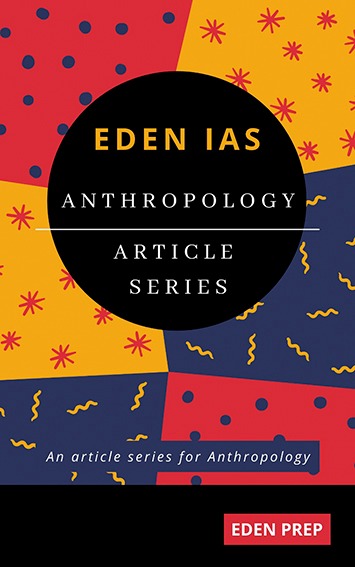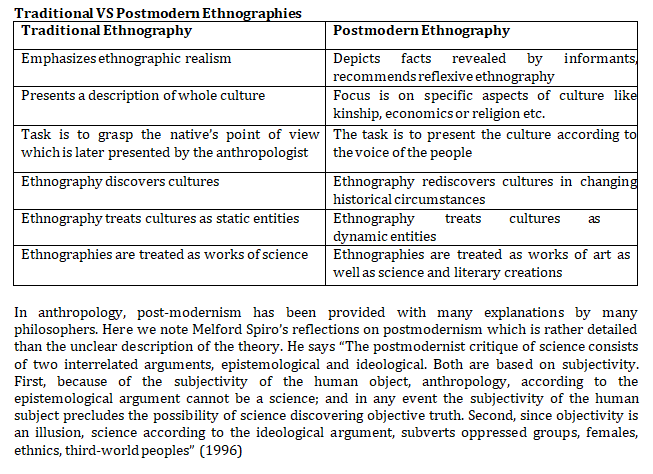
EDEN BLOGS
POSTMODERNISM SCHOOL OF THOUGHT


(Anthropology Paper I)
Syllabus Section: 6. Anthropological theories
Introduction
Postmodernism is a late 20th-century philosophical movement in arts and architecture which is a departure of modernism (that began with industrial revolution in 19th century). Post-modernism in anthropology emerged as a theoretical perspective only around 1980s. It emerged when many of the assumptions of the 20th-century fieldwork and the confidence of discovering an objective reality of culture became subjects of intense debate in anthropology. By 1990s the trickle of interest in fieldwork methods and ethnography itself had turned into a flood and became a central focus of sociocultural anthropology. Postmodernism emerged when scholars like James Clifford, George Marcus and Stephen a Tylor started questioning the validity of doing field research and writing up of data collected in the form of ethnographies.
- Postmodernism essentially promotes the following notions
- Radical Pluralism – there are many ways of knowing facts and there are many facts to a fact. This means any knowledge has multiple perspectives.
- Skeptical interpretations of culture, history, art, economics etc. (a departure from modernism which believed in historical reconstructions and techniques of interpreting facts)
- Postmodernism holds that
- o All knowledge is influenced by observer’s culture and social position and
- That there is no single objective reality but rather many partial truths depending on one’s frame of reference
Post-Modernist Approach in Anthropology
- The focus of postmodernism in Anthropology is on issues of Power and Voice
- In most 20th century ethnographic encounters the ethnographer came from a much more powerful culture than the ethnographic subjects. This history is particularly important in understanding early anthropological interpretations of other cultures
- It also challenges the fact that the ethnographer is the sole authoritative voice in representing a culture. When ethnography is a story with multiple perspectives, how can a single voice reveal true reality about a culture? Hence, ethnography is only a partial truth not revealing all sides or shades of a story.
- More accurate description of what is going on in a particular culture would be possible if ethnographers adopted more self-conscious attitudes about their own methods, assumptions and methods
- Postmodernism does not believe in ethnographic realism. It views ethnographies as unique products of particular researches, informants and field methods. Therefore, it recommends reflexive ethnography where the writer puts his or her personal feelings and reactions to the field situations right in the ethnography itself. Reflexive ethnography can be of two types
- Dialogic Ethnography – where the ethnography is presented as a dialogue between the anthropologist and one or more native informant
- Poetic Ethnography – where the ethnography adopts the conventions of a novel-like first person narration and conversation.
Modernity, Modernism and Modernization
These terms are interlinked. They came into being during the renaissance. Madan Sarup in An Introductory Guide to Post-structuralism and Postmodernism defines Modernity as “the progressive economic and administrative rationalisation and differentiation of the social world” (1993). Modernism was defined as “an aesthetic development which brought about a radical shift in consciousness and a violent transformation of social conditions in the late 19th and 20th centuries.” It was illustrated by two concerns: Self-consciousness and reflexiveness. The period when modernity and modernism were studied was started with new changes in society. The transition was seen in political and economic spheres where the change was from feudalism to industrialism. Religion got a back seat with the rise of the enlightenment movement. Urbanisation also took place. All these realities and more led scholars to theorise. This is the period which is termed as modernization that also marks the advent of positivism and scientific thinking. The designation of anthropology as a science was because of modernist thinking that prioritized rationality.
Post-modernity and Post-modernism
While modernism as a theory in modernity associated itself with ideas like identity, authority, unanimity, inevitability etc, post-modernism looks into difference, multiplicity, cynicism, documentation etc. Post-modernism deliberates that an objective and impartial view of a culture, which is not one’s own is unattainable. Post-modernist anthropological investigation started in the 1960s, which noted that earlier anthropological documentation was based on social and political frameworks which were validated by objective explanation. This, post-modernism depicts as irrational as culture and the world, usually is perceived on the basis of one’s own personal experiences and one’s own cultural life. As much as one may want to be objective in one’s interpretation of other cultures, on is unable to let go of the ingrained biases. Post-modern anthropologists try to correct this situation by trying to be sensitive and subjective as much as possible. In other words the postmodern anthropologists attempt to scrutinize, interpret and appraise existing guidelines of anthropology and at the same time try to survey its codes, regularity and procedures of study.
Influencing Figures of Postmodernism
In social sciences, Friedrich Nietzsche and Martin Heidegger, German philosophers, were the first who inspired postmodern philosophy. However it was the French philosophers like Jacques Derrida, Jean Baudrillard, Michel Foucault etc. who actually developed the theory. Anthropologists who were encouraged to forward this thought are Clifford Geertz, James Clifford, George Marcus, Nancy Hughes etc.
The main adherents of postmodernism in anthropology are discussed below
Clifford Geertz (1926-2006): Clifford Geertz though prominently known for his work on postmodernism in Anthropology had himself conflicting views about the theory. However his thoughts on post-modernism in anthropology can be divided into two parts. The first half of post-modernism was controlled by literature mostly with concentration on text, genre, style of writing, narration, fiction, dialogue, allegory, representation, symbols etc while the second half of post-modernism dealt with the political aspect of societies. He delved into issues of authority, power and power structure. Issues studied in post-colonialism related to power equations was also deliberated by Geertz, for example, colonialism and power, racism, exoticism. He also questioned the use of narratives about colonies by the Western colonizers and their own understanding of them which differs with the post-modern arena. This connects his views with post-colonialism.
James Clifford: Like all core post-modernists, James Clifford also advocated the idea that an objective viewpoint in studying and writing ethnography is not possible. For him ethnography makes the author describe it with persuasion where her/his preferences unconsciously come forward. Hence for Clifford, to deconstruct or critique the way ethnographies are written is the main essence of post-modernism. To do away with the rhetoric by which ethnographers assert power, ethnographies should be more descriptive than being completely interpretive. His views therefore are in total contrast with Clifford Geertz who has been interpretive to a large extent in his ethnographic explanations. James Clifford, states that the balance between the ethnographers’ understanding of a group and the group themselves can be maintain through a holistic perspective.
Nancy Scheper-Hughes (1944- ): Nancy Scheper-Hughes is a professor in Medical Anthropology at the University of California, Berkeley. She believes that cultures and societies cannot be studied or valued without morally or ethically understanding them. Only by taking ethics into consideration while studying a society can anthropologists reflect analytically. These views of hers are noticed in her works Primacy of the Ethical (2006) and Death without Weeping (1993). This postmodern perspective of hers thus suggests that Anthropologists should be made responsible for depicting or failing to depict the discipline as a crucial instrument while describing significant historical periods.


{{doubts.user.firstName}}
{{doubts.createdAt | formatDate}}